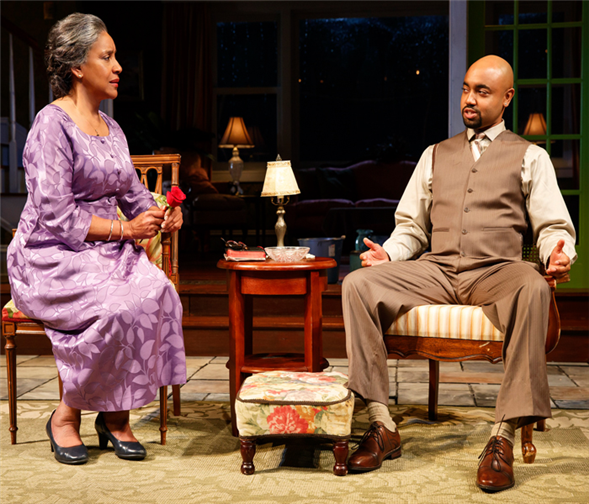Translate Page

How Francois Battiste connects to his role in Head of Passes
---
The first time Francois Battiste saw Tarell Alvin McCraney, the playwright was dancing by himself in the middle of a lawn at Oxford University.
It was 2005 and Battiste was studying abroad through his acting training at Juilliard, and McCraney was there as part of his program at Yale. Battiste's friends had told him there was an amazing writer around, and when they spotted McCraney doing his thing in the quad, they pointed him out.
"I looked out the window and there's this tall guy dancing beautifully, and I was like, 'That's the playwright?'" Battiste says, the shock still present in his tone. "And that's the first time I laid eyes on him."
The actor is laying eyes on the writer much more often these days, as Battiste stars in McCraney's Head of Passes, a modern retelling of the Book of Job set in Louisiana at the mouth of the Mississippi River. In the production currently running at the Public Theater, Battiste plays Aubrey, the middle son of Shelah (Phylicia Rashad). Aubrey adores his mother and tries to plan a birthday gathering for her in the face of a rising flood that threatens to overtake their town.
As he talks about his character's tendency to dote on and idolize his mother, Battiste notes that he plays a similar role in his own family, in which he is the youngest of three boys.
"I have real in-depth conversations with my parents, much more than both my older brothers," he says. "I'm interested in knowing my parents. I ask them intrusive questions. I don't want the time to escape and for me to wonder what made them do this and that. Carpe diem! Let's find out why they're here."
{Image1}
Meanwhile, Battiste compares learning the dialogue in McCraney's play to learning Shakespeare on "a rhythmic level."
"It's so colloquial," he says. "It's as if Tarell has taken a transcript of how we talk, and if you think about it, how we talk in just regular social banter that you hear on the street, it's like jazz music. Some of the riffs are incomplete; some of the thoughts are incomplete. The most challenging part of doing this piece is paying attention and giving respect to those incomplete thoughts."
Battiste also sees the play addressing large social issues. "It's set in Louisiana on the Head of Passes---how can you not think about climate change?" he says, noting the section of the Mississippi that gives the show its name. How can you not think about our society as a whole? It's all part of the mosaic that Tarell is exploring."
He adds that the Public itself is similarly committed to producing politically conscious work. Discussing Oskar Eustis, the theater's artistic director, he laughs and says, "He's woke! He's conscious. He never shies away from a story that may deal with the ugliness of the American tapestry. He believes that in order to really heal a nation, you really have to get down to the true thing which divides us. I don't want to put words in his mouth, but I think he believes that has to do with a sense of educating the public on what has happened in America so we can move forward."
---
Follow Suzy Evans at @suzyevans. Follow TDF at @TDFNYC.
Photos by Joan Marcus. Top photo: Phylicia Rashad and Francois Battiste
TDF members: Go here to browse our current discounts for theatre, dance, and concerts.